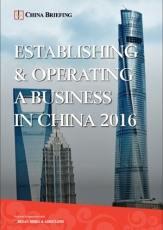Betting the Farm: Modernizing China’s Agriculture Sector
By Winnie Jin
China continues to build on what it hopes will be the path to a more efficient, modern agricultural industry. On September 18, the Chinese government announced plans to invest RMB three trillion into modernizing the country’s agriculture by the year 2020. A loan from the state-owned policy lender Agricultural Development Bank of China will be used to develop the industry, protect national food security, and support overseas business, as well as to increase efficiency with modern equipment and improve incomes in rural areas.
China’s Agricultural Industry
The push for agricultural modernization in China is not a new phenomenon. The CPC Central Committee and State Council have made agriculture the main focus of the annual Number One Central Document for thirteen consecutive years. A proposal for the “professionalization and modernization” of China’s agriculture industry was also a key focal point of China’s 13th Five Year Plan, released earlier this year.
While urbanization continues to rise, 45 percent of China’s population still depends on agriculture as their primary source of income. Farmers are given collective land ownership rights by the state, resulting in fragmented land plots that make large-scale agribusiness difficult to execute without land transfers. Additionally, China suffers from an arable land shortage, with only seven percent of the world’s arable land but nearly 20 percent of the world’s population. The concern over national food security arises from the problem of whether to rely on global markets for staple items or to keep production domestic, which requires heavy subsidization. By 2011, China had already become the world’s largest importer of agricultural products, and today consumer demand continues to outpace domestic supply.
 RELATED: Pre-Investment and Entry Strategy Advisory from Dezan Shira & Associates
RELATED: Pre-Investment and Entry Strategy Advisory from Dezan Shira & Associates
In response to these pressures on the industry, China has promised to shape policy and funnel resources toward agricultural modernization. By 2020, the government is aiming to create over 53 million hectares of farmland and invest in technology and training for farmers. The rural land transfer process has also been accelerated, and large-scale landholders are currently granted higher subsidies. Because it is obvious that the global market is integral to meeting the country’s agricultural demand, the government is also directing some attention overseas. On September 20, the Ministry of Agriculture signed a memorandum of understanding with the China Council for the Promotion of International Trade, solidifying their strategy of increasing overseas agricultural investment and trade.
Implications for Foreign Investors
Agriculture is designated as a strategic industry in China and certain sectors are thus protected from foreign investment. In particular, foreign investment in businesses such as genetically modified crop seeds is prohibited or restricted.
However, opportunities are still abundant in equipment or permitted agricultural products. Along with other industrializing nations, China will account for two-thirds of the global market for new agricultural machinery over the next three years. With the government’s support, farmers are experimenting with technology, using drones to distribute pesticides and tractors to harvest crops.
While some agricultural businesses have been heavily restricted for foreign investment, other activities such as coffee cultivation and fertilizer production are encouraged. Consumer preferences for foreign and imported products also remain strong. For foreign investors, China’s long-term trend of subsidizing the development and modernization of its agricultural industry promises fresh opportunities in the coming years.
|
Asia Briefing Ltd. is a subsidiary of Dezan Shira & Associates. Dezan Shira is a specialist foreign direct investment practice, providing corporate establishment, business advisory, tax advisory and compliance, accounting, payroll, due diligence and financial review services to multinationals investing in China, Hong Kong, India, Vietnam, Singapore and the rest of ASEAN. For further information, please email china@dezshira.com or visit www.dezshira.com. Stay up to date with the latest business and investment trends in Asia by subscribing to our complimentary update service featuring news, commentary and regulatory insight.
|

 Establishing & Operating a Business in China 2016
Establishing & Operating a Business in China 2016
Establishing & Operating a Business in China 2016, produced in collaboration with the experts at Dezan Shira & Associates, explores the establishment procedures and related considerations of the Representative Office (RO), and two types of Limited Liability Companies: the Wholly Foreign-owned Enterprise (WFOE) and the Sino-foreign Joint Venture (JV). The guide also includes issues specific to Hong Kong and Singapore holding companies, and details how foreign investors can close a foreign-invested enterprise smoothly in China.
 An Introduction to Doing Business in China 2016
An Introduction to Doing Business in China 2016
Doing Business in China 2016 is designed to introduce the fundamentals of investing in China. Compiled by the professionals at Dezan Shira & Associates in June 2016, this comprehensive guide is ideal not only for businesses looking to enter the Chinese market, but also for companies who already have a presence here and want to keep up-to-date with the most recent and relevant policy changesSelling, Sourcing and E-commerce in China 2016
 China Investment Roadmap: the Education Sector
China Investment Roadmap: the Education Sector
In this issue of China Briefing, we navigate through China’s regulatory framework for investment into education, presenting a roadmap for best practices in the industry. We examine the key market information that has driven the industry’s growth, analyze the different investment models that are available for foreign companies, and finally discuss the effect that China’s recently released NGO law will have on foreign investment into education.
- Previous Article China Set to Implement New ‘Five-in-One’ Business License
- Next Article The Complexity of Transfer Pricing for Intercompany Services









